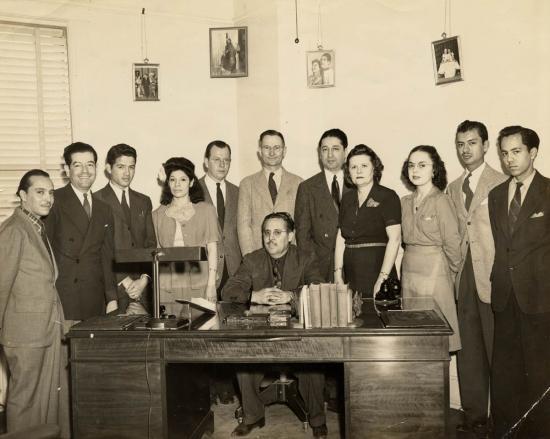Early Life and Background
Raoul A. Cortez was born on September 17, 1905, in Veracruz, Mexico. His family moved to San Antonio, Texas, when he was a young boy, seeking better opportunities and a safer environment during a time of political upheaval in Mexico. Growing up in a bicultural environment, Cortez developed a deep understanding of the challenges faced by Mexican Americans. This duality of experience would later shape his life’s work and advocacy.
Career Beginnings in Media
Cortez’s career in media began in the 1920s, a period marked by significant social and political changes in the United States. Despite facing discrimination and limited opportunities, Cortez was determined to make a difference. He started working at local Spanish-language newspapers, where he quickly gained recognition for his writing and editorial skills.
In 1940, Cortez took a significant step by founding KCOR-AM, the first full-time Spanish-language radio station in the United States. This was a groundbreaking achievement, as it provided a platform for Spanish-speaking communities to access news, entertainment, and cultural programming in their native language. KCOR-AM not only bridged the gap between Spanish-speaking audiences and mainstream media but also became a vital tool for community organization and advocacy.
Founding KCOR-TV
Building on the success of KCOR-AM, Raoul A. Cortez set his sights on the burgeoning television industry. In 1955, he launched KCOR-TV (now KWEX-DT), the first Spanish-language television station in the United States. This venture was not without its challenges; Cortez had to overcome financial hurdles, skepticism from advertisers, and regulatory obstacles. However, his unwavering determination and visionary leadership saw KCOR-TV become a beacon of representation for Hispanic audiences.
KCOR-TV offered a diverse range of programming, including news, entertainment, educational content, and cultural shows. The station played a crucial role in preserving Hispanic culture and traditions, showcasing local talents, and providing a platform for community voices. Cortez’s work in television not only entertained but also educated and empowered Spanish-speaking communities, fostering a sense of identity and pride.
Advocacy and Community Leadership
Raoul A. Cortez was more than a media pioneer; he was a passionate advocate for civil rights and social justice. He used his media platforms to highlight issues affecting Mexican Americans and other Hispanic communities, such as discrimination, poverty, and lack of access to education and healthcare. Cortez believed in the power of media to bring about social change and worked tirelessly to amplify marginalized voices.
In addition to his work in media, Cortez was actively involved in various civic and community organizations. He co-founded the League of United Latin American Citizens (LULAC), one of the oldest and most influential Hispanic civil rights organizations in the United States. LULAC aimed to advance the economic condition, educational attainment, political influence, and civil rights of Hispanic Americans. Cortez’s involvement in LULAC and other organizations demonstrated his commitment to improving the lives of Hispanic communities through both media and direct action.
Legacy and Impact
Raoul A. Cortez’s contributions to media and advocacy have left a lasting legacy. He paved the way for future generations of Hispanic journalists, broadcasters, and activists. His pioneering efforts in radio and television created opportunities for greater representation and visibility for Hispanic communities in the media landscape.
Cortez’s work also highlighted the importance of cultural preservation and empowerment. By providing platforms for Spanish-language content, he ensured that Hispanic culture and traditions could be celebrated and passed down to future generations. His advocacy for civil rights and social justice continues to inspire those who fight for equality and inclusion today.
In recognition of his contributions, Raoul A. Cortez has been honored with numerous awards and accolades. His legacy lives on through the continued success of Spanish-language media in the United States and the ongoing work of organizations dedicated to advancing Hispanic rights and representation.
Conclusion
Raoul A. Cortez was a trailblazer whose impact on media and advocacy cannot be overstated. From founding the first full-time Spanish-language radio and television stations in the United States to his tireless work for civil rights, Cortez’s contributions have had a profound and lasting effect on Hispanic communities. His vision, determination, and dedication serve as a powerful reminder of the importance of representation, cultural preservation, and advocacy in the fight for social justice. As we reflect on his legacy, we are reminded of the vital role that media and community leadership play in shaping a more inclusive and equitable society.
